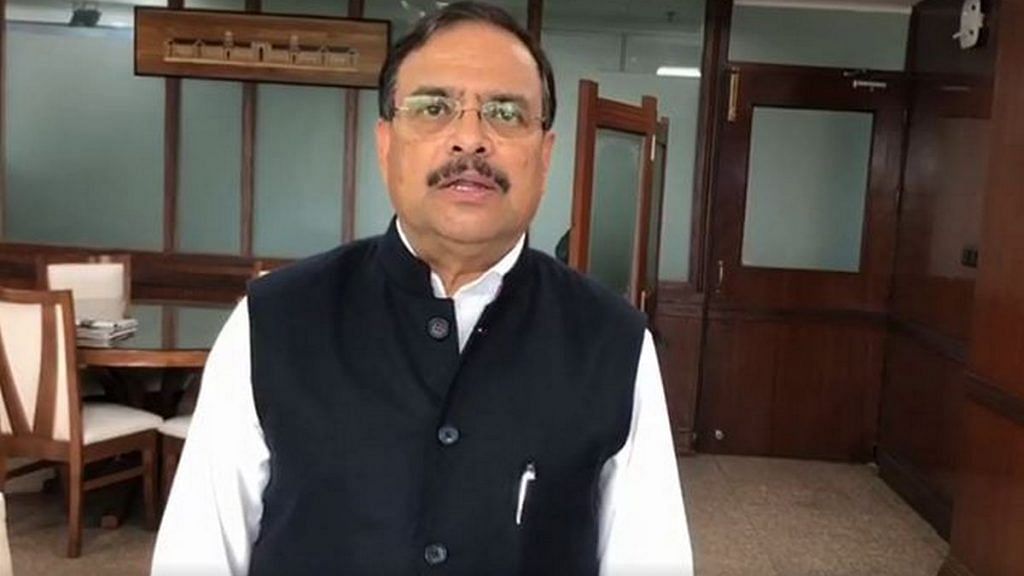New Delhi: The Narendra Modi government is preparing a rollout plan for successful implementation of the Covid-19 vaccine once it becomes available, ThePrint has learnt.
In an interview to ThePrint, retired IAS officer C.K. Mishra said the country’s experience in rolling out the Universal Immunisation Programme in 1985 will help India in designing a strategy for distribution of the Covid-19 vaccine.
“While there are hopes for an early arrival of the vaccine, it is not coming immediately. However, the government is already preparing a plan of its rollout, as and when it is available. It will definitely not be possible to vaccinate the entire population at the same time,” he told ThePrint.
Mishra chaired the central government’s empowered group on Covid-19 testing, hospital assessment and disease surveillance from the beginning of the lockdown until May end.
He retired as the secretary, Ministry of Environment, Forest & Climate Change, in May. Prior to this, he was the secretary, Ministry of Health and Family Welfare.
“Of course, there has to be a plan in place to spell out the phased rollout. Definitely, this plan should be made now,” he said.
Mishra, who is also known as the force behind ‘Mission Indradhanush’ — the largest campaign to immunise children in India — said introduction of vaccines such as pentavalent, for measles, mumps and rubella (MMR), as well as rotavirus were done in a phased manner.
“These vaccines were first introduced in a few states. Availability and need were the determining factors. In case of Covid-19 vaccine, it may be groups of people across states, depending on the priority and urgency,” he said.
Mishra added, “While experts would take a call on this matter, perhaps it could be health workers and the vulnerable population who may be given priority access to the vaccine in the first phase of distribution.”
Also read: Oxford vaccine human trial in India a step closer as panel clears Serum Institute protocol
‘India has handled Covid-19 well’
Mishra, who is known for leading negotiations at critical forums such as the United Nations Framework Convention on Climate Change, Montreal Protocol and various other multilateral events, said there was “no doubt” the government has handled Covid-19 well.
“The virus has put to test the best of health systems globally, but India has still done well comparatively,” he added.
He also said one should look at the number of deaths in India to gauge how the country has fared. “…the most critical factor would be damage and loss of lives that it (Covid-19) has caused. This is where India has done well.”
He said, “Interventions have been appropriate and absolutely timely. Early action and timely lockdown have certainly helped cut transmission, arrested surge in numbers and saved thousands of lives.”
Mishra questioned various other parameters that are being used to assess the novel coronavirus’ impact in India. “People have been using different parameters and denominators. When some talk about the total number of positives, they say India is right at the top. But these people also say that per million tests have been less.”
He also advised using the “same denominator” and maintaining uniformity in analyses.
“India has a huge population, so we need to remove ambiguities and use the same denominator, look at per million infected, per million tested, and per million hospitalised. Even though we need to recognise the problem with the seriousness it deserves, we also need to be uniform in our analysis.”
Also read: Tulasi milk, ashwagandha milk, ginger milk — Karnataka gets new drinks to ‘boost immunity’
‘Recovery rate is healthy indicator’
The former IAS officer said there will always be this debate on what could have been done better and what hasn’t been.
“We learnt every day, shaped our response and changed strategies depending on the challenge. There is always a scope of doing better, but we must acknowledge good work wherever it has been done,” he said.
According to Mishra, “recovery rate is a healthy indicator” that is being promoted by the government more than any other parameters.
Many public health experts believe that recovery rate is being used to boost optimism of the general public even though it doesn’t reveal the real situation. Mishra, however, said “recovery rate should be seen as a mirror to the number of active cases”.
“It is these active cases that we really need to care for. There could be differences of opinion among the experts on the calculations,” he added.
More people, he said, were getting discharged and hospitals aren’t as overwhelmed as it was expected. “This shows that our policy of home isolation and hospital care is working.”
Lockdown played a ‘positive role’ in cutting down transmission
The former health secretary said the nationwide lockdown played a positive role in the entire strategy to contain Covid-19.
“It came in timely and with a purpose. The idea was to cut transmission, reduce or flatten the curve of infections, avert mortality, and allow time to prepare our hospital systems.”
While he said norms were flouted in several places during the phased reopening of cities, the officer also noted things have been well “overall”.
“You have to have a strategy and full precaution in place while unlocking. Masks and social distancing are key strategies in the road ahead.”
Also read: Human challenge trials for Covid vaccine unnecessary, unethical — Fauci at ICMR symposium
